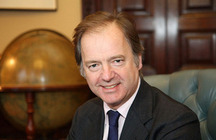Hugo Swire – 2014 Speech on Human Rights
Below is the text of the speech made by Hugo Swire on 3rd March 2014.
Madam Vice President, Madam Deputy High Commissioner, Excellencies, it is an honour to be here today to address the Human Rights Council in this distinguished company.
The United Kingdom is committed to strengthening the work of this vital forum; to supporting countries in improving their human rights records; and to holding to account those who commit serious and systematic violations of their citizen’s rights.
People around the world look to this Council to defend their fundamental rights, freedoms and dignity. I am delighted that the United Kingdom has once again been afforded the opportunity to contribute to this vital work. I would like to thank all those who supported our candidacy and I look forward to working with other members of the Council, and the wider international community, in protecting the most vulnerable and championing global causes including ending sexual violence in conflict, the need for the full participation of women in peace-building, and the universal right to freedom of expression and freedom of religion or belief.
Without action – if we let human rights abuses go unchecked and ignored – we sow the seeds of future instability, conflict and humanitarian crisis. That is why the Secretary General’s “Rights up Front” Initiative to strengthen the UN’s ability to tackle human rights abuses early and effectively is so important and why this Council must be at the forefront of that effort.
When countries show they are willing to engage seriously with the Human Rights Council, we can and should work with them in a spirit of partnership and collaboration. This can produce real change, as we know from working with Somalia. The United Kingdom has played a leading role in mobilising international support for Somalia. The London Conference we co-hosted in 2013 recognised the immense importance of human rights in the peace process and in September we co-sponsored, with the Somali government, a resolution of this Council, calling for increased UN support to help end human rights abuses and combat impunity.
In many other countries too, concrete and positive change is underway and I pay tribute to all those who make this progress possible. I thank the High Commissioner for Human Rights for her leadership and the valuable work of her Office; the Treaty Bodies, the Special Rapporteurs and Commissions of Inquiry for providing us with crucial information on human rights situations across the world. I thank all those dedicated men and women in the field working to help states and civil society to strengthen protection for human rights. Through the Universal Periodic Review, our countries also have a valuable opportunity to learn from each other and discuss together the human rights challenges we face.
But while we strive for partnership and collaboration, we cannot stay silent if countries fail to live up to their human rights obligations.
A year ago, this Council asked the High Commissioner to report on the human rights situation in Sri Lanka. That report, received by members of this Council in recent days, is unambiguous. The Government of Sri Lanka has failed to ensure independent and credible investigations into alleged violations and abuses committed by both parties during the conflict in Sri Lanka. The majority of recommendations from successive Human Rights Council resolutions remain unimplemented, nor has the Sri Lankan Government accepted offers of technical assistance from the UN. The time has now clearly come for international action with regard to Sri Lanka. This Council has a duty to act on the findings of the report we collectively commissioned and to establish the truth. If we fail to do so, where does that leave us? I hope the Human Rights Council can unite to support the call for an independent investigation into alleged human rights violations and abuses on both sides. This will help pave the way for lasting reconciliation.
I believe that the support and technical assistance of the Office of the High Commissioner and the collective concern expressed in the resolutions of this Council have a valuable role to play in ensuring progress towards lasting peace and reconciliation in Sri Lanka.
The Commission of Inquiry on Syria has collected vital evidence on the worsening human rights situation. We condemn all violations and abuses, regardless of who commits them. But I want to be clear. States have a primary duty to protect their populations, but instead the Syrian government terrorises its people with barbaric attacks, besiegement, rape, torture, systematic executions and disappearances.
Here in the Human Rights Council we should confront the appalling human rights situation in Syria and agree a resolution. To ensure our credibility, this Council must show the Syrian people that their suffering will not be ignored, and we must renew the mandate of the Commission of Inquiry. We need to be clear that those who commit horrendous and appalling crimes will be brought to justice, and we must ensure that the Commission of Inquiry has full access inside Syria, because the Assad government cannot be allowed to hide its crimes.
Two weeks ago, this Council received the report of the Commission of Inquiry on Human Rights in the Democratic People’s Republic of Korea (DPRK). Their findings indicate widespread, state sanctioned, horrific violations. They include: torture; rape; summary executions; disappearances; and using starvation as a means of control and punishment. The UK strongly believes there should be no impunity for human rights violators. The DPRK has for too long refused to comply with its international obligations or engage properly with this Council or its mechanisms. We must take action. We cannot stand by.
Elsewhere, the UK is extremely concerned by events in Ukraine. Just last night the British Foreign Secretary visited Kyiv and called on Russia to respect the sovereignty, independence and territorial integrity of Ukraine. He also spoke to the UN Secretary General to encourage international efforts to de-escalate tensions in the region. The UK supports Ukraine’s new government and calls on all parties to ensure that the rights of all Ukraine’s citizens, including from minority groups, are respected.
Mr President, we believe that the international community must address all forms of discrimination, not least on the basis of sexual orientation and gender identity, and we must also promote respect for diversity. We must work through the UN to address discriminatory laws which criminalise the LGBT community.
Sexual violence has marked every conflict in our lifetime and shattered the lives of women, girls, men and boys on every continent. For too long, these crimes have been treated as secondary issues, as inevitable consequences of war, and only a tiny number of perpetrators have ever been held to account.
This is unacceptable. Ending these horrors is a moral cause for our generation. All of us, Governments, civil society and the UN must work together to shed light on these crimes, to shatter the culture of impunity, and support, protect and reintegrate survivors.
140 countries have now signed the historic declaration of commitment to end sexual violence in conflict which we launched at the General Assembly in September last year. But that is only the beginning. We must now turn those commitments into lasting practical action, raise awareness and build partnerships worldwide. That is why the Foreign Secretary has convened a global summit in London in June this year, the largest ever on this issue, which he will co-host with the Special Envoy of the UN High Commissioner for Refugees, Angelina Jolie.
They will bring together governments, their militaries, law enforcement agencies, legal experts, international organisations and civil society to agree the necessary steps that will put an end to sexual violence in conflict. I hope that all the countries in this room today will join us in this effort to remove these abhorrent crimes from the world’s arsenal of cruelty. In the 21st century, the world will not understand why countries cannot support such an initiative.
Mr President, together we can make an enormous contribution. We should not underestimate the impact we can have if we work collectively. So, I hope that we can work closely in the Human Rights Council to improve respect and protection for human rights worldwide, to respond quickly and robustly to serious violations and to create lasting change in support of international peace and security. And eradicate injustices that affect people – often the most vulnerable – in the world.


